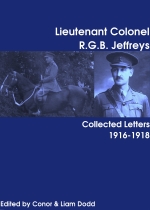The letters of Lieutenant Colonel R.G.B. Jeffreys are a rare and important primary source. This book contains the First WorldWar experiences of an officer of the Royal Dublin Fusiliers. Few accounts such as this were written by men of the regiment and even fewer have survived. Although the letters must be looked at objectively and with an understanding that they are from the point of view of an upper class officer, they do give an excellent insight not only into the major battles of the Great War, which tends to be the focus of most publications, but also everyday life in the trenches and billets of the Western Front. These letters written to his wife during his period at the front between 1916 and 1918 have much information contained within them, that will give a better understanding of not only the Royal Dublin Fusiliers in the Great War but also of most other regiments which were involved in the conflict. With the passing of Great War veterans, it is important that accounts such as this are preserved, as these are the only way in which the history of the war can be told properly through the words of the men who were there and experienced the futility of war. It is for these reasons that this diary is being published, not only for aiding historians and family researchers of the Great War but also for those who simply wish to gain a better understanding and insight into this important period.

Richard Griffith Bassett Jeffreys was born on the 10th of January 1876 at Dunmore County Galway. His father was an army officer and he went to England for his education at Bedford School, after which he joined the army and underwent his officers training. He was commissioned into the Royal Dublin Fusiliers and was soon sent to South Africa where during the Boer War he was mentioned in Lord Robert’s dispatches whilst attached to the Mounted Infantry. It was 1916 before Jeffreys was first sent to France during the First World War, arriving in Bolougne less than a month before the first day of the Somme offensive, in which he was to personally play little part. However later in the war Jeffreys and his battalion played major roles in battles at Messines and Passachaendaele, which resulted in him being mentioned in dispatches three times, (including once by Sir Douglas Haig). He was awarded the Distinguished Service Order in the new year of 1918 and stayed with the Royal Dublin Fusiliers until their disbandment along with all of the other southern Irish regiments in 1922. With the disbandment of the regiment he had served with for over 20 years, he was sent to the 2nd Battalion North Stafford Regiment where he was appointed second in command. His time with this regiment however was short lived, while on two months leave, on the 10th of January 1923, Jeffreys and his wife Grace, whom he had married in 1909, were killed when the plane in which they were flying crashed near Ajaccio, Corsica.




